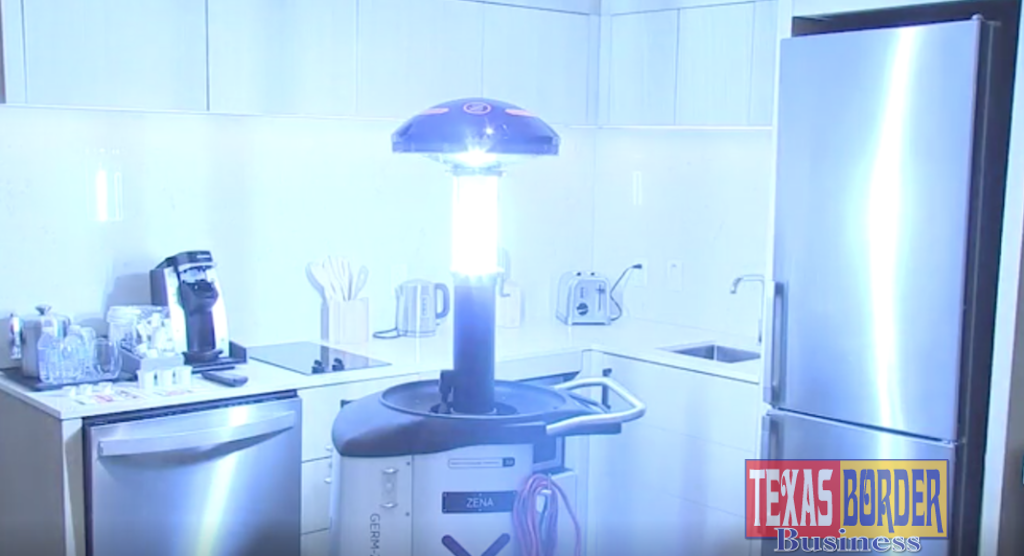
Texas Border Business
The Westin Medical Center Hotel in Houston, Texas, is using special robots that blast out UV rays to help better cleanse rooms as the coronavirus continues to sweep across the United States.
The Westin Medical Center Hotel in Houston has become the first hotel in the country to use new ultraviolet light robots to combat germs and pathogens amid the coronavirus outbreak, and the company that makes the robot says interest in the technology is surging as the crisis escalates.
LightStrike Germ-Zapping Robots have been deployed to carry out part of the cleaning process for the hotel in what is now a more effective and quicker way to sanitize rooms after guests check out.
The technology used by the robot has previously only been seen in the medical healthcare field, but with the growing demand for disinfections due to coronavirus, the robots are being sent into hotels for the first time.
The robot uses an intense UV light to kill bacteria and SARS and MERS, other strains of the coronavirus family, down to the microscopic level. UV light can damage or destroy various types of pathogens and the destructive power of UV light depends on factors such as wavelength and the type of organism the rays are impacting, Melinda Hart, a spokesperson for Xenex Disinfection Services, the technology company that manufactures the robot, told AccuWeather.
Research has yet to be published showing that UV light has the same effect on SARS-CoV-2, the virus behind the COVID-19 outbreak. But some experts believe UV light, which primarily comes from the sun, could also kill the strain.
“LightStrike pulsed xenon lamps produce a flash of intense germicidal light across the entire disinfecting spectrum delivered in millisecond pulses,” Hart said in an email. “The intense germicidal light created by our robot does four kinds of damage to pathogens (like coronavirus). The primary types of cellular damage caused by pulsed xenon UV are photohydration (pulling water molecules into the DNA that prevents transcription), photo-splitting (breaking the backbone of the DNA), and photodimerization (improper fusing of DNA bases), all of which prevent cell replication.”
Hart said the technology also induces cell lysis, “an irreversible form of cell death.”
There may not be many people traveling these days, with all of the social distancing that’s in effect, but travelers who stay in rooms cleaned with the technology may be able to rest a little more easily.
“We disinfected the surfaces of all the bath amenities and we placed it in this bag,” Archit Sanghvi, VP of Westin Houston Medical Center, told KPRC-TV. “So when a guest arrives, they can open it and feel a sense of comfort that this was thoroughly disinfected.”
The robot takes only two minutes to clean an area and can even kill certain strains of coronavirus, Dr. Sarah Simmons of Xenex told KTRK-TV. Hart said the robot uses new technology that creates intense germicidal light that can quickly deactivate viruses and spores. Older technology relied on the use of mercury bulbs, which don’t create as strong a UV light.
“This technology has been tested against MERS-CoV, which is another coronavirus and we are effective,” said Simmons.
Xenex is a San Antonio based company that was founded in 2009 that has since raised more than $90 million for research and development of the robot, according to Xconomoy.
“UV light has been used for disinfection for decades,” Hart said. She said the robot was initially designed to clean hospital rooms and deliver a strong enough dose of UV light to kill superbugs.
The deepening crisis around the world has resulted in new interest in the technology around the world, Hart said.
“We’ve seen a significant increase in our technology as a result of the COVID-19 outbreak,” Hart told AccuWeather. “We are shipping robots overseas daily, and U.S. demand has surged this week.” She said the robot is also used by the Los Angeles Police Department.












